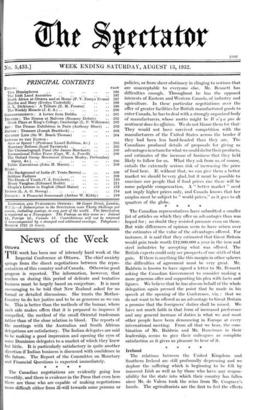The Canadian negotiations are evidently going less smoothly, and there
is evidence in the Press that even here there are those who are capable of making negotiations more difficult either from ill-will towards some persons or policies, or from sheer obstinacy in clinging to notions that are unacceptable to everyone else. Mr. Bennett has difficulties enough. Throughout he has the opposed interests of Eastern and Western Canada, of industry and agriculture. In these particular negotiations over the offer of greater facilities for British manufactured goods to enter Canada, he has to deal with a strongly organized body of manufacturers, whose motto might be Il n'y a pas de sentiment dans les affaires. We do not blame them for that They would not have survived competition with the manufacturers of the United States across the border if they had been less hard-headed than they are. The Canadians produced details of proposals for giving us advantages in return for what we could do for their products, and estimates of the increase of business that they held likely to follow for us. What they ask from us, of course, entails the extremely serious risk of increasing the price of food here. If, without that, we can give them a better market we should be very glad, but it must be possible to convince our people that if food prices rise there will be some palpable compensation. A " better market " need not imply higher prices only, and Canada knows that her surplus must be subject to " world prices," as it goes to all quarters of the globe.






























